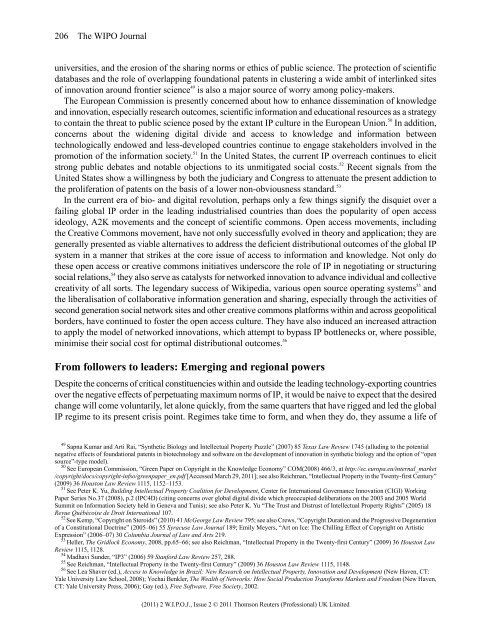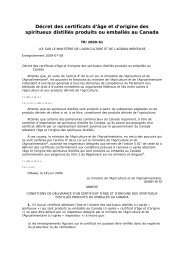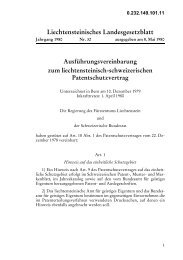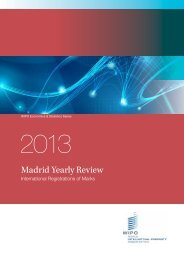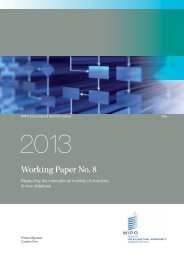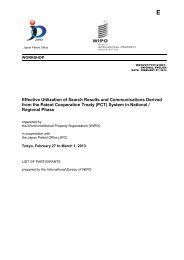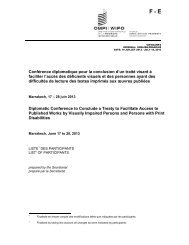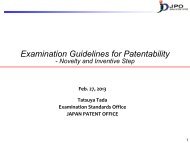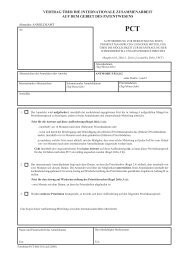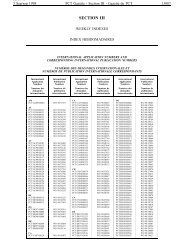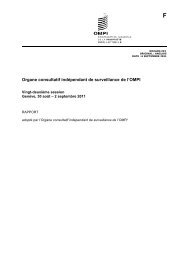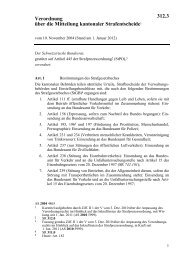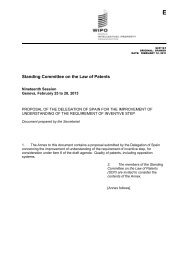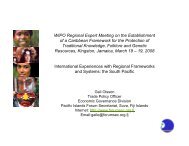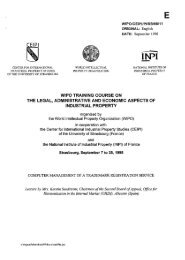WIPO Journal - World Intellectual Property Organization
WIPO Journal - World Intellectual Property Organization
WIPO Journal - World Intellectual Property Organization
Create successful ePaper yourself
Turn your PDF publications into a flip-book with our unique Google optimized e-Paper software.
206 The <strong>WIPO</strong> <strong>Journal</strong><br />
universities, and the erosion of the sharing norms or ethics of public science. The protection of scientific<br />
databases and the role of overlapping foundational patents in clustering a wide ambit of interlinked sites<br />
of innovation around frontier science 49 is also a major source of worry among policy-makers.<br />
The European Commission is presently concerned about how to enhance dissemination of knowledge<br />
and innovation, especially research outcomes, scientific information and educational resources as a strategy<br />
to contain the threat to public science posed by the extant IP culture in the European Union. 50 In addition,<br />
concerns about the widening digital divide and access to knowledge and information between<br />
technologically endowed and less-developed countries continue to engage stakeholders involved in the<br />
promotion of the information society. 51 In the United States, the current IP overreach continues to elicit<br />
strong public debates and notable objections to its unmitigated social costs. 52 Recent signals from the<br />
United States show a willingness by both the judiciary and Congress to attenuate the present addiction to<br />
the proliferation of patents on the basis of a lower non-obviousness standard. 53<br />
In the current era of bio- and digital revolution, perhaps only a few things signify the disquiet over a<br />
failing global IP order in the leading industrialised countries than does the popularity of open access<br />
ideology, A2K movements and the concept of scientific commons. Open access movements, including<br />
the Creative Commons movement, have not only successfully evolved in theory and application; they are<br />
generally presented as viable alternatives to address the deficient distributional outcomes of the global IP<br />
system in a manner that strikes at the core issue of access to information and knowledge. Not only do<br />
these open access or creative commons initiatives underscore the role of IP in negotiating or structuring<br />
social relations, 54 they also serve as catalysts for networked innovation to advance individual and collective<br />
creativity of all sorts. The legendary success of Wikipedia, various open source operating systems 55 and<br />
the liberalisation of collaborative information generation and sharing, especially through the activities of<br />
second generation social network sites and other creative commons platforms within and across geopolitical<br />
borders, have continued to foster the open access culture. They have also induced an increased attraction<br />
to apply the model of networked innovations, which attempt to bypass IP bottlenecks or, where possible,<br />
minimise their social cost for optimal distributional outcomes. 56<br />
From followers to leaders: Emerging and regional powers<br />
Despite the concerns of critical constituencies within and outside the leading technology-exporting countries<br />
over the negative effects of perpetuating maximum norms of IP, it would be naive to expect that the desired<br />
change will come voluntarily, let alone quickly, from the same quarters that have rigged and led the global<br />
IP regime to its present crisis point. Regimes take time to form, and when they do, they assume a life of<br />
49<br />
Sapna Kumar and Arti Rai, “Synthetic Biology and <strong>Intellectual</strong> <strong>Property</strong> Puzzle” (2007) 85 Texas Law Review 1745 (alluding to the potential<br />
negative effects of foundational patents in biotechnology and software on the development of innovation in synthetic biology and the option of “open<br />
source”-type model).<br />
50<br />
See European Commission, “Green Paper on Copyright in the Knowledge Economy” COM(2008) 466/3, at http://ec.europa.eu/internal_market<br />
/copyright/docs/copyright-infso/greenpaper_en.pdf [Accessed March 29, 2011]; see also Reichman, “<strong>Intellectual</strong> <strong>Property</strong> in the Twenty-first Century”<br />
(2009) 36 Houston Law Review 1115, 1152–1153.<br />
51<br />
See Peter K. Yu, Building <strong>Intellectual</strong> <strong>Property</strong> Coalition for Development, Center for International Governance Innovation (CIGI) Working<br />
Paper Series No.37 (2008), p.2 (IPC4D) (citing concerns over global digital divide which preoccupied deliberations on the 2003 and 2005 <strong>World</strong><br />
Summit on Information Society held in Geneva and Tunis); see also Peter K. Yu “The Trust and Distrust of <strong>Intellectual</strong> <strong>Property</strong> Rights” (2005) 18<br />
Revue Québécoise de Droit International 107.<br />
52<br />
See Kemp, “Copyright on Steroids” (2010) 41 McGeorge Law Review 795; see also Crews, “Copyright Duration and the Progressive Degeneration<br />
of a Constitutional Doctrine” (2005–06) 55 Syracuse Law <strong>Journal</strong> 189; Emily Meyers, “Art on Ice: The Chilling Effect of Copyright on Artistic<br />
Expression” (2006–07) 30 Columbia <strong>Journal</strong> of Law and Arts 219.<br />
53<br />
Heller, The Gridlock Economy, 2008, pp.65–66; see also Reichman, “<strong>Intellectual</strong> <strong>Property</strong> in the Twenty-first Century” (2009) 36 Houston Law<br />
Review 1115, 1128.<br />
54<br />
Madhavi Sunder, “IP3” (2006) 59 Stanford Law Review 257, 288.<br />
55<br />
See Reichman, “<strong>Intellectual</strong> <strong>Property</strong> in the Twenty-first Century” (2009) 36 Houston Law Review 1115, 1148.<br />
56<br />
See Lea Shaver (ed.), Access to Knowledge in Brazil: New Research on <strong>Intellectual</strong> <strong>Property</strong>, Innovation and Development (New Haven, CT:<br />
Yale University Law School, 2008); Yochai Benkler, The Wealth of Networks: How Social Production Transforms Markets and Freedom (New Haven,<br />
CT: Yale University Press, 2006); Gay (ed.), Free Software, Free Society, 2002.<br />
(2011) 2 W.I.P.O.J., Issue 2 © 2011 Thomson Reuters (Professional) UK Limited


